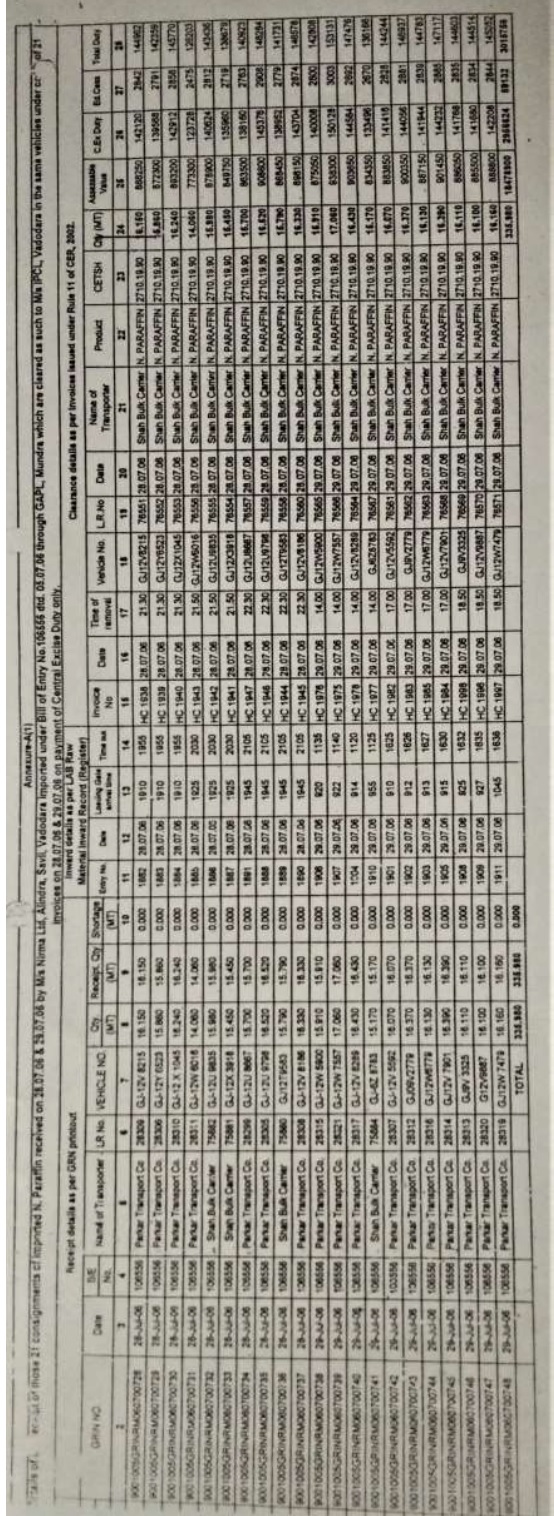Case Law Details
Nirma Limited Vs C.C.E. & S.T. Vadodara-i (CESTAT Ahmedabad)
Introduction: In the recent case of Nirma Limited Vs C.C.E. & S.T. Vadodara-i, the Customs, Excise, and Service Tax Appellate Tribunal (CESTAT) in Ahmedabad dismissed an appeal filed by Nirma Limited. The central dispute revolved around the unloading and mixing of goods in a factory tank, with the tribunal finding this claim to be an afterthought.
Analysis: Nirma Limited, a manufacturer of Linear Alkyl Benzine (LAB) and N-Paraffin (NP), imported and domestically manufactured NP, storing both in the same storage tank. During July-August 2006, Nirma cleared 747.195MT of manufactured NP to M/s. India Power Corporation Limited (IPCL) under 57 excise invoices.
After an extensive investigation, it was concluded that out of the total cleared, 335.980 MT was imported NP. The conclusion was made based on 21 invoices out of 57 that did not include the LAB analysis report.
The CESTAT determined that the 21 consignments, alleged to be imported and not unloaded in the factory, were directly cleared to IPCL in the same vehicle. From the evidence, it was apparent that the imported goods were not unloaded in the factory premises, and were cleared just a short time after arrival without testing to IPCL. The tribunal dismissed the defense of Nirma Limited stating that the goods were unloaded in the factory and mixed in the tank as an afterthought.
Conclusion: The dismissal of the appeal by CESTAT Ahmedabad underscores the importance of maintaining transparency in supply chain operations and ensuring due diligence in the testing and clearance of goods. This decision will serve as a reminder to businesses to adhere to all relevant regulations and processes for importing and manufacturing raw materials. Failure to do so can lead to significant legal repercussions, as demonstrated in this case.
FULL TEXT OF THE CESTAT AHMEDABAD ORDER
This appeal has been filed by M/s. Nirma Limited against order of Commissioner (Appeals) rejecting appeal filed by appellant.
2. Learned Counsel for the appellant pointed out that the appellants are manufactures of Linear Alkyl Benzine (LAB) and the appellants are also manufacturing “N – Paraffin (NP)”, which is a major raw material for the production of (LAB). The appellants are also importing “N – Paraffin” against advance license granted by the Licensing Authority. The appellants have a common storage tank for storing “N – Paraffin (NP)”. The imported “N – Paraffin” as well as the domestically manufactured “N – Paraffin” are both storage in the same storage tank. During the period July, 2006 to August, 2006, the appellant cleared 747.195MT of manufactured “N – Paraffin” to M/s. India Power Corporation Limited (IPCL) on payment of Central Excise under cover of 57 excise invoices. After detailed investigation revenue came to the conclusion that out of 747.195 MT cleared by the appellant for home consumption 335.980 MT was imported “N-Paraffin”. The said conclusion was based on the fact that in respect of 21 invoices out of 57, issued for domestic clearance during which period, did not have the LAB analysis report. The argument of revenue was that the quantity cleared from the domestically manufactured goods always contains a LAB analysis report.
3. Learned AR relies on impugned orders.
4. We have gone through the rival submissions. It was also found that the 21 consignments which contained no test report were allegedly imported consignments to M/s. India Power Corporation Limited (IPCL). The details of 21 consignment cleared are given in table below:

4.1 The said 21 consignments which were imported under advance license were allegedly not unloaded in the factory and were directly cleared to M/s. India Power Corporation Limited (IPCL) in the same vehicle. A perusal of the annexure to the SCN shows that the vehicle mentioned in the GRIN for receipt of the imported material and the vehicle number shown in the excise invoice for clearance of the said invoice is identical. The date on which the said GRN for receipt of goods were issued is identical to the date which the corresponding invoices were issued. The quantity mentioned in the GRN number for receipt of imported goods were identical to the quantity mentioned in the invoice issued for clearance for home consumption to IPCL. arrival time of imported consignment was just a few hours prior to the out ward time of the domestic clearance of same quantity in the same vehicle.
From the above, it is apparent that the goods imported by the appellant were not unloaded in the factory premises, but cleared as such in the same truck, just a little time after arrival, without any testing to M/s. India Power Corporation Limited (IPCL). The defense of the appellant is that the goods were unloaded in the factory and got mixed in the tank is obviously an afterthought.
5. In these circumstances, we do not find any merit in the argument of the appellant, the appeal is dismissed.
(Pronounced in the open Court on 14.06.2023 )




